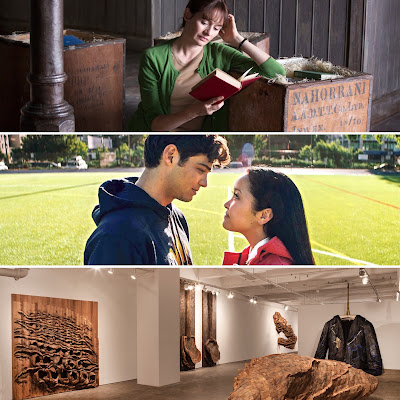ROUND-UP August 20-28, 2018
Last round-up post for the lovely month of August!
- "Mourning and Awe in Ursula von Rydingsvard’s 'The Contour of Feeling' at the Fabric Workshop and Museum." Artblog, August 20, 2018.
"The Contour of Feeling is a balancing act between the morbid and the life-affirming— between showing the human intervention and masking it to create the appearance of objects found in nature. The sheer scale of the works creates a reflexive, immediately palpable sense of awe. Most are larger than life-size; “Thread Terror,” a square plank over eight feet tall placed against a wall, is disrupted by parasitic-looking protuberances that erupt across its otherwise uniform surface. Beside it, “Echo” and “Sunken Shadow” resemble massive shovels, reminding me inexorably of digging a grave."
- "'To All The Boys I've Loved Before' Is Netflix's Best Rom-Com Yet." BUST Magazine, August 21, 2018.
"When Lara Jean sits down with Peter to establish the rules for how their “relationship” will be portrayed and presented, it’s a clever nod to how high-profile relationships are conducted in today’s age of 24-hour news, tabloids, and social media—except it’s explicit instead of implicit (I imagine). For the media-savvy of today, if it wasn’t documented in a photo on Instagram or a pithy tweet, it might as well have not even happened at all, and when it comes to celebrities under intense media attention, the wrong gesture or candid look could mean that the entire relationship is on the rocks. Within the ecosystem of their high school, Lara Jean and Peter’s relationship is the equivalent of a celebrity plucking a partner out of obscurity, and if they don’t appear to be following the norms of how relationships are documented and observed, no one will actually believe they’re together."
- "[Review:] The Bookshop." Moviejawn, August 28, 2018.
"The bookshop is merely a prop to be used in a morality play that condemns the ignorant and those resistant to change and makes Florence into a martyr for daring to shake things up—to bring a little creativity into people’s lives. It’s a noble argument, to be sure, but it’s one that has been made by countless other works of art, which have done it better. Again, I must return to Chocolat, which contains pretty much every element present in The Bookshop, but presents them in infinitely richer and more tantalizing ways. They’re even set in the same postwar time period—1959. It’s as if to ward off comparisons to Chocolat, the team behind The Bookshop has gone in completely the other direction from that headier film. Where chocolate is daring, forbidden, and tempting, rooted in physical pleasure and experience, books are items that Florence says are important, but ultimately don’t accomplish much in the narrative of the film: they’re MacGuffins, infinitely replaceable with any other item that might push the envelope in a homogeneous small town."

Comments
Post a Comment